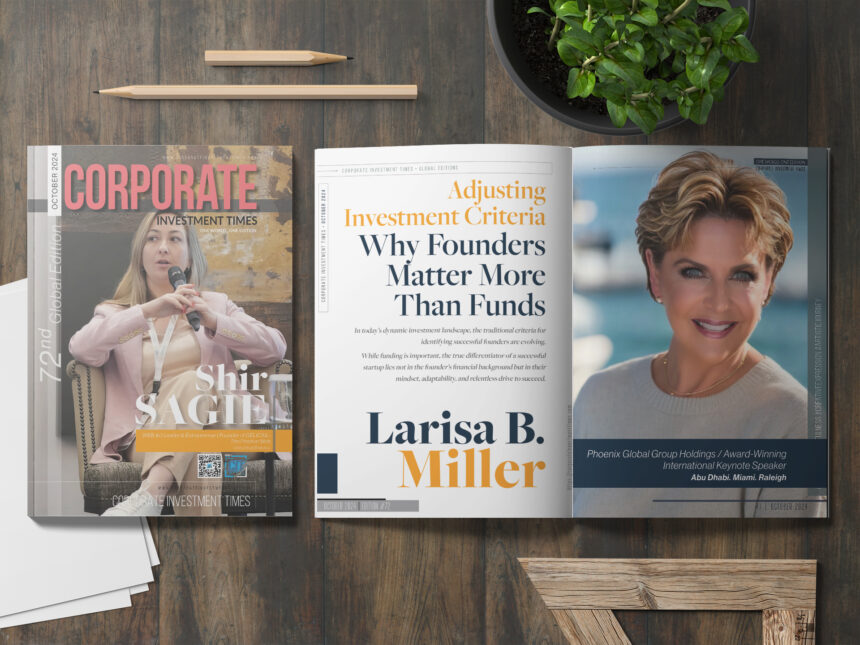In today’s dynamic investment landscape, the traditional criteria for identifying successful founders are evolving.
While funding is important, the true differentiator of a successful startup lies not in the founder’s financial background but in their mindset, adaptability, and relentless drive to succeed.
A founder with a strong sense of purpose, grit, and a willingness to learn can often outperform one who is well-funded but comes from a background of entitlement and ease.
Recently, during a Q&A session following one of my speeches, I was asked what we look for in an investor and, in turn, what investors typically prioritize when working with startups. This is precisely the focus of this article—understanding the shift in investment criteria and how both founders and investors need to adapt to ensure success.

At the heart of innovation and entrepreneurship is the founder’s mentality. Those who thrive under pressure, where failure is not an option, often possess a creativity and adaptability that founders with more comfortable origins may lack. The founder who bootstrapped their way through the early stages, learned to pivot when necessary, and found creative solutions with limited resources is a far more valuable investment than one who relies solely on external funding from friends and family. When there’s no “take it or leave it” option, the founder has no choice but to make the business work, driving their success with unparalleled dedication.
The Risk of Entitlement
Even if a founder has a billion-dollar idea, the presence of ego can be a significant red flag for investors. A founder who isn’t open to feedback, who believes they have nothing more to learn, or who dismisses criticism can steer a company off course. Ego can cloud judgment, stifle innovation, and ultimately damage the potential of even the most promising ventures. A good steward of investment funds is one who is committed to constant learning, embracing adaptability, and listening to the guidance of those with experience or different perspectives. In today’s ever-evolving business environment, life never stops teaching, and a successful founder understands that learning must be a continuous process.
What’s also key to note is that the business model a founder starts with is rarely the one they end up with after one, two, or five years. The early assumptions may change as they face challenges, discover new trends, collaborate across industries, or even stumble upon problems they hadn’t anticipated. The best founders are those who adapt, evolve, and remain willing to refine their ideas. These founders can transform their business by embracing new insights and feedback.
The Danger of ‘Entrepreneur’s Disease’
Another significant concern for investors is what I call ‘entrepreneur’s disease.’ This occurs when a founder is constantly asking, ‘What if we did this? What if we added that?’ without first solidifying the core foundation of their business. While innovation and adaptability are important, there is a fine line between evolution and distraction. Entrepreneurs who chase shiny objects, constantly shifting their focus to new ideas, are a big red flag for investors. If a founder is perpetually chasing the next big thing without fully executing the original vision, it raises serious concerns about their ability to be a good steward of investor capital.
I once worked with a highly promising agritech company that had a billion-dollar idea. The potential was extraordinary, but the founder couldn’t stay focused on the go-to-market strategy. Instead, they continually tried to add new elements or pursue different ideas before establishing a solid market entry for their core product. This constant lack of focus made the company, despite its incredible potential, ultimately uninvestable.

Building a successful startup requires focus and discipline. Founders need to establish a solid foundation before expanding or adding new elements. Constantly pivoting without direction or stability is like throwing jello at the wall to see if it sticks—chaotic, unpredictable, and ultimately unsustainable. For an investor, this lack of focus suggests a founder may not fully understand the importance of managing resources effectively, which could lead to mismanaged funds and unfulfilled potential. Staying focused, building incrementally, and proving success in the core business is what drives long-term growth and resilience.
Attributes of Entrepreneurial Leadership: What Investors Look For
From an investor’s perspective, one of the most important factors in a startup’s success is the founder’s leadership attributes. Investors know that beyond a great idea, it’s the founder’s ability to lead with decisiveness, courage, and emotional intelligence that often determines the outcome of the business. A founder must be able to make decisions without seeking endless opinions, remaining resolute in those decisions. The ability to see a decision through to its conclusion—whether it succeeds or fails—shows a level of maturity and strength that reassures investors. It’s this kind of decisive leadership that turns initial capital into long-term growth.
Courage is another critical attribute that investors prioritize. Being a founder is risky, and investors understand that. But they also want to know that the founder is willing to take calculated risks, make bold moves when necessary, and push through fear. Courage mitigates regret, and investors want to back a founder who embraces uncertainty, taking bold steps when the moment calls for it, even when the outcomes aren’t guaranteed.

Emotional intelligence is a critical trait in a successful founder, as it directly impacts how they lead and manage their team. Investors look for founders who understand that their employees are more than just workers—they are the core of the company’s success. A founder with strong emotional intelligence values the input and contributions of their team, actively listens to their ideas, and involves them in key decisions. This approach not only builds trust and loyalty but also empowers employees to take ownership of their roles, driving a deeper commitment to the company’s mission. When employees feel valued and trusted, they become passionate advocates for the brand, helping to foster a positive culture and a strong sense of purpose. For investors, this is crucial—because a motivated and engaged workforce is key to scaling the business effectively, ensuring long-term growth and resilience.
Ultimately, investors aren’t just looking for a solid business plan or market opportunity—they’re looking for founders with the leadership attributes to execute that plan. Decisiveness, courage, emotional intelligence, and team inclusion are qualities that can take a business from an idea to a thriving enterprise. For an investor, these attributes are essential indicators of a founder’s ability to be a good steward of their capital and to lead the company toward long-term success.
Types of Investors: What Founders Should Know
For young founders, understanding the types of investors they will encounter is crucial. Different investors seek different attributes in the companies and founders they back.
Family Offices: Often intergenerational, family offices are interested not just in returns but in long-term legacy and value alignment. As these offices transition leadership to younger generations, their investment priorities tend to shift. Younger generations may push for investments that reflect today’s social and environmental concerns, from sustainability to tech innovations. A founder who can demonstrate the ability to navigate these priorities, while bringing innovative ideas, will resonate with these evolving investors.
Venture Capital (VC): Venture capital is fast becoming a significant asset class in modern portfolios. VC firms look for innovative, out-of-the-box ideas that can disrupt markets. With rapid technological advancements, venture capitalists are more willing to take risks on startups that challenge traditional business models. Founders in this space must not only have groundbreaking ideas but also the grit and adaptability to see them through the ever-changing landscape of tech and business trends.
Private Equity (PE): While traditionally focused on more mature businesses, private equity is also evolving. PE investors are now increasingly seeking opportunities in startups that show scalability and robust business models. The future of private equity will likely involve more direct engagement with early-stage businesses, particularly those in high-growth sectors. Here, founders need to balance long-term growth strategies with operational efficiency, proving they can sustain and scale their ventures.
A New Era of Investment Thinking
In the current business climate, it’s no longer enough to solve today’s problems with yesterday’s solutions. Investors are increasingly looking for founders who recognize that doing things differently is essential to unlocking new opportunities. From family offices adjusting their focus for a new generation, to venture capitalists seeking the next big disruption, and private equity evolving its investment thesis, one thing remains clear: founders who embrace adaptability, learning, and innovation are the ones who will succeed.
As both founders and investors navigate this new landscape, it’s essential to remember: If you want opportunities that your competitors don’t have, you must be willing to do business in ways your competitors are not. This approach is not only about innovation but also about how effectively you leverage leadership, build resilient teams, and foster adaptability. Investors are seeking these qualities more than ever, because it’s this mindset and operational approach that sets companies up for sustained success—and makes them a smart and secure investment.



